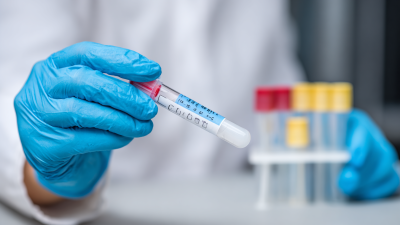Step-by-Step Guide to Understanding H Pylori Testing: Stool vs. Blood Analysis
Table of Contents
- Understanding H Pylori: The Basics of Testing Methods
- Exploring Stool Tests: Procedures and Advantages
- Blood Tests for H Pylori: What You Need to Know
- Comparative Accuracy: Stool vs. Blood Tests for H Pylori
- Interpreting Your Test Results: Key Takeaways
- When to Choose Each Testing Method: A Practical Guide
- FAQS
- Conclusion
- Related Posts
Did you know that Helicobacter pylori, or H. pylori for short, is actually a pretty common culprit behind stomach issues around the world? In fact, the World Health Organization estimates that roughly half of the world's population might be carrying it. That’s pretty crazy, right? Because catching it early really makes a difference, having accurate and reliable tests is super important. When it comes to testing, the stool and blood tests for H. pylori have become pretty central in how doctors figure out what’s going on. Companies like Jiangsu Macro & Micro-Test Med-Tech are constantly pushing the envelope with new in vitro diagnostic tools, which means better chances of detecting the infection accurately—and that’s good news for patients. In this blog, I’ll walk you through the ins and outs of the difference between stool and blood tests for H. pylori. Whether you're a healthcare pro or just someone curious about your health, I want to help you get a clearer picture so you can make informed decisions without the confusion.

Understanding H Pylori: The Basics of Testing Methods
So, you might have heard of H. pylori, or Helicobacter pylori — it's basically a bacteria that can set up shop in your stomach. And honestly, it's often behind things like ulcers and long-lasting gastritis. If you’re trying to figure out whether you have it, knowing a bit about how they test for this bug is super important. There are two main ways docs usually check for H. pylori: stool tests and blood tests. Both have their own pros and cons, which can influence which one they choose.
Stool tests, also called fecal antigen tests, are pretty popular because they’re non-invasive — meaning no sticking needles or anything — and they’re quite accurate. They look for specific H. pylori antigens in your stool, so you get results pretty fast. It's especially handy for confirming an infection or seeing if your treatment is working. On the flip side, blood tests work by checking for antibodies against H. pylori. That can tell if you’ve ever been infected or if you’re currently dealing with it. They're quick and easy, but sometimes they might not give a clear picture of whether the infection is active — especially if you’ve already started treatment. Knowing how these tests work helps both doctors and patients make smarter choices when it comes to diagnosing and managing H. pylori.
Overall, understanding the ins and outs of these testing methods can really make a difference in getting proper diagnosis and care.
Exploring Stool Tests: Procedures and Advantages
When it comes to figuring out if you have an H. pylori infection, stool tests are actually a pretty reliable and non-invasive way to do it, and they’re getting more popular these days. The process is usually pretty simple—you just collect a small sample of your stool, and then it gets sent off to a lab to check for the bacteria’s antigens. Your doctor will give you instructions on how to do it right so the results are accurate. Honestly, the whole thing is pretty hassle-free, and because it doesn’t involve any uncomfortable procedures, a lot of people find stool tests to be a really good option.
One of the big perks of stool testing is that it’s really good at detecting active infections — it’s both sensitive and specific. Unlike blood tests, which might just tell you if you’ve had an infection in the past (like showing antibodies), stool tests give you a more direct picture of whether the bacteria’s actually still there. Plus, they’re useful not just for diagnosis but also for seeing if treatment has worked. They can tell you if the bacteria are gone after treatment, which is super helpful when managing H. pylori. All in all, stool tests are a handy tool because they’re straightforward, reliable, and can serve both diagnostic and monitoring purposes in a pretty convenient way.
Comparison of H. Pylori Testing Methods: Stool vs. Blood Analysis
This chart provides a comparison of the effectiveness and advantages of stool tests and blood tests for H. Pylori testing.
Blood Tests for H Pylori: What You Need to Know
So, when it comes to figuring out if you have a Helicobacter pylori, or H. pylori, infection, doctors usually start with blood tests. These tests look for antibodies—that’s the body's response—so they can tell if you’ve ever been exposed to the bacteria. One of the biggest perks? They’re pretty simple and quick, no need for invasive procedures or anything complicated.
That said, it's good to keep in mind that blood tests aren’t perfect. Sometimes, they might show you’ve had the infection even if it’s gone, because those antibodies can stick around for a while. That’s why doctors usually prefer to combine blood tests with other options, like stool antigen tests or breath tests, to get a clearer picture. Knowing the ins and outs of blood testing for H. pylori can really help you understand what to expect and make smarter decisions about your health journey.
Comparative Accuracy: Stool vs. Blood Tests for H Pylori
When you're trying to figure out if someone has an H. pylori infection, choosing between a stool test and a blood test really matters for getting accurate answers. From what I’ve read, stool antigen tests tend to be pretty trustworthy — they have about 80-90% accuracy in catching active infections, and over 95% in not giving false positives. That’s why many doctors, especially those at the American Gastroenterological Association, recommend stool tests because they’re non-invasive and can tell you right away if the bacteria is actually present in your gut.
On the flip side, blood tests that check for antibodies against H. pylori usually don’t do as well. Studies from the World Gastroenterology Organization point out that while these blood tests might pick up past infections, they often miss current ones. That’s because the antibodies can stick around for years even after the infection is gone, which means a positive blood test doesn’t necessarily mean you’re actively infected right now. So, if you’re after a clear and reliable diagnosis, stool tests are generally the way to go — they’re more accurate and give a better picture of your current situation. All in all, when it comes to deciding between stool vs. blood for H. pylori testing, stool tests really seem to be the better choice for most folks out there.
Interpreting Your Test Results: Key Takeaways
So, when you're trying to get a grip on H. pylori testing, really understanding what your results mean is super important if you want to get effective treatment. H. pylori is that bacteria linked to stomach ulcers and even some types of gastric cancer. You can find out if you’ve got it through different tests—most commonly, a stool test or a blood test. The stool test checks for the bacteria itself or its antigens, and it tends to give quicker results, plus it’s better at telling if you actually have an active infection right now. On the other hand, blood tests look for antibodies, which can hang around long after the infection’s gone—so a positive blood result doesn't necessarily mean you're currently infected. It’s kind of a gray area there.
When you get your results back, make sure you know what kind of test was done. A positive stool test pretty much confirms you’ve got an active infection, so treatment can start right away. But if it’s a positive blood test, it might need a bit more digging—because it doesn’t tell you for sure if the infection is still active. Knowing these little details helps you chat more confidently with your doctor and understand what’s going on. Just keep in mind, test results are only one piece of the puzzle. Talking things through with your healthcare provider is really key to figuring out the best plan moving forward.
When to Choose Each Testing Method: A Practical Guide
When you're trying to figure out if you have H. pylori, picking the right test really makes a difference in getting accurate results and finding the right treatment. Usually, stool tests—sometimes called fecal antigen tests—are a popular choice because they’re pretty simple and non-invasive. Basically, they look for H. pylori antigens in your stool, and the results tend to come back pretty quickly. If you’re dealing with stomach issues or other gut symptoms, this test is especially handy since it’s straightforward and doesn’t mean going through any uncomfortable procedures.
On the flip side, blood tests are also an option, especially if stool testing isn’t available or if you need quick answers. These tests check for antibodies you’ve developed against H. pylori. The catch? They can’t really tell if the infection is current or if it's something you had in the past. So, while a blood test can show you’ve been exposed, it’s not the best way to confirm an active infection. Understanding these little details can really help both patients and doctors make smarter choices about which test to go for, based on your specific situation.
FAQS
: The procedure involves collecting a small stool sample, which is then analyzed in a laboratory for the presence of H. pylori antigens. Patients receive instructions from their healthcare provider to ensure accurate sample collection.
Stool tests have high sensitivity and specificity for detecting active infections and provide a direct assessment of infection status, whereas blood tests may indicate past infections or antibodies.
Yes, stool tests can accurately show whether the H. pylori bacteria have been eradicated after treatment, making them useful for monitoring treatment effectiveness.
Blood tests detect antibodies to the H. pylori bacterium, indicating whether an individual has been exposed to the bacterium at some point in time.
Blood tests may lead to false positives because antibodies can remain in the bloodstream long after the infection has cleared, which does not reflect the current infection status.
A positive stool test confirms an active infection, while a positive blood test may require further evaluation, as it does not indicate whether the infection is ongoing.
Combining blood tests with other diagnostic methods, such as stool antigen tests or breath tests, provides a more comprehensive evaluation of H. pylori infection status.
Thorough consultation with a healthcare provider is crucial for understanding test results and ensuring appropriate care and management based on individual results.
Conclusion
When it comes to testing for H. pylori, understanding the difference between a stool test and a blood test is pretty important if you want accurate results and the right treatment. This guide walks you through the basics of these testing methods—covering how they work, their pros and cons, and how they stack up in terms of accuracy. Plus, I’ll share some practical tips on how to interpret your results and decide which test might be best for your situation.
Here at Jiangsu Macro & Micro-Test Med-Tech Co., Ltd., we’re all about pushing the boundaries of diagnostic tech. Our goal? Make sure patients get access to reliable, innovative testing options. Since we started back in 2010, we’ve put a big emphasis on R&D and top-notch manufacturing, which helps us make a real impact in the world of in vitro diagnostics—especially when it comes to H. pylori testing.
Related Posts
-

The Future of H Pylori Testing Innovations in Stool and Blood Analysis
-

Future Trends in Gene Cyp2c19 Market Analysis for 2025 and Beyond
-

Exploring Creative Alternatives to Sourcing Wholesale At Home Fish Test Suppliers
-

5 Key Benefits of Using Influenza A&B Test for Early Diagnosis
-

Understanding the Cost Factors for Wholesale Fish Blood Testing in Your Business
-

Exploring the Features and Applications of Cervical Cancer Self Test Kits: A Comprehensive Guide

